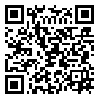Volume 78, Issue 9 (December 2020)
Tehran Univ Med J 2020, 78(9): 589-597 |
Back to browse issues page
Download citation:
BibTeX | RIS | EndNote | Medlars | ProCite | Reference Manager | RefWorks
Send citation to:



BibTeX | RIS | EndNote | Medlars | ProCite | Reference Manager | RefWorks
Send citation to:
Keyvanara M, Satari M, Jangi M, Sharbafchizadeh N, Rahele R. Prediction of the Iranians self-care in terms of communication pattern of their individual and social characteristics in face of Covid-19 pandemic-2020. Tehran Univ Med J 2020; 78 (9) :589-597
URL: http://tumj.tums.ac.ir/article-1-10826-en.html
URL: http://tumj.tums.ac.ir/article-1-10826-en.html
1- Social Determinants of Health Research Center, Isfahan University of Medical Sciences, Isfahan, Iran.
2- Health Information Technology Research Center, Isfahan University of Medical Sciences, Isfahan, Iran.
3- Health Management and Economics Research Centre, Isfahan University of Medical sciences, Isfahan, Iran.
2- Health Information Technology Research Center, Isfahan University of Medical Sciences, Isfahan, Iran.
3- Health Management and Economics Research Centre, Isfahan University of Medical sciences, Isfahan, Iran.
Abstract: (1680 Views)
Background: Infectious diseases in the pandemic stage have significant life-threatening, psychological and social effects. Identifying the characteristics associated with people's cooperation in self-care leads to greater immunity for themselves and others. Therefore, this study was conducted to predict the self-care of the Iranian people according to their individual and social characteristics in face of the Covid-19 pandemic.
Methods: A survey study was conducted on 1056 adults aged 18 and over in different provinces of Iran through a form of answering online researcher-made questions (n=40, α=0.9) in social networks in four days. This paper studies the level of self-care of people against Covid 19 pandemic which was conducted with the support of Isfahan University of Medical Sciences in April 2016. Data were analyzed using Student t-test and variance. Moreover, "decision tree technique" was used to identify communication patterns.
Methods: A survey study was conducted on 1056 adults aged 18 and over in different provinces of Iran through a form of answering online researcher-made questions (n=40, α=0.9) in social networks in four days. This paper studies the level of self-care of people against Covid 19 pandemic which was conducted with the support of Isfahan University of Medical Sciences in April 2016. Data were analyzed using Student t-test and variance. Moreover, "decision tree technique" was used to identify communication patterns.
|
Results: The findings showed that the average self-care score in women, the most educated, married women, women aged 41 to 55, housewives and some other occupations was very high. However, the average self-care score of single men with a diploma was average. In general, the mean score of women's self-care was higher than men (P<0.0001) and the educated were more than the less educated literate (P=0.007). There was no significant difference between the self-care scores of the respondents in terms of their marital status and employment.
Conclusion: The results showed that the average scores of self-care in women, more educated people, married women, women in the age group of 41 to 55 years, housewives and some other occupations were reported to be very high; While the average self-care score reported in single men with a diploma was average. Overall, the mean score of self-care reported in women was higher than men (P<0.0001) and people with doctoral education reported more self-care than illiterate people (P=0.007). Besides, there was no significant difference between the self-care scores of the respondents in terms of their marital status (single and married) and their employment status (employed and non-employed). |
Type of Study: Original Article |
| Rights and permissions | |
 |
This work is licensed under a Creative Commons Attribution-NonCommercial 4.0 International License. |





